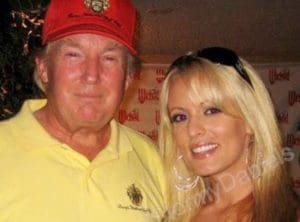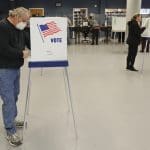Election commissioners picked by Trump let him off the hook for hush money payments
One of the commissioners worked for Donald Trump’s 2016 campaign.

The Federal Election Commission’s Republican members, two Donald Trump appointees, blocked a staff-recommended examination of Trump’s alleged campaign finance violations on Thursday.
An investigation was recommended after Trump’s former personal attorney Michael Cohen admitted as part of a 2018 plea agreement to making the illegal contributions in the form of hush money to women, including $130,000 to Stormy Daniels, with whom Trump allegedly had extramarital affairs.
The commission voted 2-2 on whether to examine if Trump violated campaign finance law by, as the FEC’s general counsel wrote, “knowingly accepting excessive contributions from Michael D. Cohen,” his former fixer.
The resulting deadlock means an investigation will not proceed, as it needed four votes out of six to move forward. One Trump-appointed Republican commissioner, Vice Chair Allen Dickerson, recused himself from the matter. Another, independent Steve Walther, missed the vote but later voted against a motion to dismiss the allegations.
By design, the Federal Election Commission can have no more than three Republican and three Democratic members at a time — meaning enforcement matters are frequently blocked by deadlocks. Former Common Cause President Scott Harshbarger observed in 2002 that the Commission is “probably the only agency in Washington that has done from the beginning exactly what it was intended to do, which was to do nothing.”
For much of the Trump administration, the commission lacked a quorum to take any action at all. In his final year in office, Senate Republicans finally filled vacant seats with Trump four appointees (three Republicans and one Democrat) — three of them confirmed in the lame-duck session after Joe Biden had defeated Trump.
James Trainor, one of the two Republicans who blocked action against Trump, was not only a Trump appointee but also helped to get him elected. During the 2016 Republican National Convention, he worked to stop “Never Trump” Republicans from undermining Trump’s platform and coronation. He later worked in Trump’s administration, at the Department of Defense.
During his Senate confirmation hearings last year, Democrats urged Trainor to recuse himself from matters related to the Trump campaign. He explicitly refused to do so.
The other Republican commissioner who joined Trainor on Thursday is Sean Cooksey. Prior to his appointment, he worked as deputy chief counsel to Sen. Ted Cruz (R-TX) and as the top Judiciary Committee aide to Sen. Josh Hawley (R-MO).
The commission’s Democrats, Ellen Weintraub and Chair Shana Broussard denounced their colleague’s move.
“To conclude that a payment, made 13 days before Election Day to hush up a suddenly newsworthy 10-year-old story, was not campaign related, without so much as conducting an investigation, defies reality,” they wrote. “But putting that aside, Cohen testified under oath that the made the payment for the principal purpose on influencing the election.”
Common Cause Vice President for Policy & Litigation Paul S. Ryan suggested in a statement on Thursday that a double standard is evident in campaign finance enforcement.
“Crystal Mason, a Black woman, was sentenced to five years in prison for inadvertently violating an election law in 2016. She thought she was allowed to vote and filled out a provisional ballot that was never counted,” he wrote. “
Donald Trump blatantly and intentionally violated federal campaign finance laws on his way to winning the 2016 presidential election,” but the GOP Commissioners “blocked investigation and enforcement of Trump’s violations,” he added.
Ryan also noted that the Department of Justice has five months, under the statute of limitations, to bring its own charges against Trump over his apparent crimes — and that the agency is badly in need of restructuring.
The “For the People Act”, passed by the House, would eliminate the deadlocked design of the Federal Election Commission. It is currently pending in the Senate, where Republicans have vowed to block it.
Published with permission of The American Independent Foundation.
Recommended

New group will advocate for increased voting access for Alabamians with disabilities
A national group focused on expanding access to the ballot box for those with disabilities is launching a chapter in Alabama.
By Ralph Chapoco, Alabama Reflector - April 22, 2024
Youngkin blocks Democratic bills dealing with elections
Vetoes affect ranked choice voting and voting rights lawsuits
By Graham Moomaw, Virginia Mercury - April 11, 2024
Lawmakers close in on online voter registration in New Hampshire
New Hampshire lawmakers are inching closer to creating a statewide election portal, a bipartisan proposal that would allow residents to register to vote online.
By Ethan DeWitt, New Hampshire Bulletin - March 15, 2024









































































